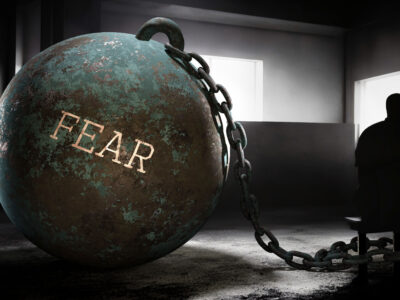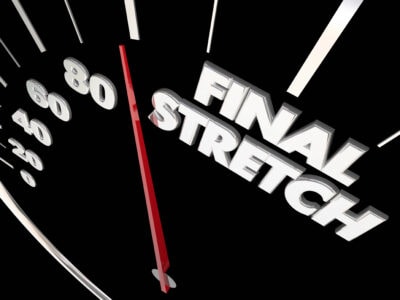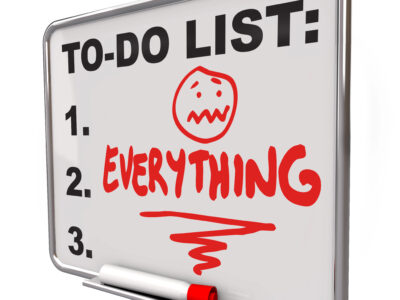Creative work can be hard.
We’re making stuff that didn’t exist before, often with very few guidelines or guardrails. If we’re going to turn it into a living, then we also have to share it, sell it, talk about it. None of which is easy.
So we protect ourselves with creative blocks. They are as complex and inventive as we are, and they come in all shapes and forms.
But in the end, they mostly come down to fear.
Fear of failure. Fear of rejection. Fear of disappointment. Fear of not being good enough. Fear of making the wrong choice. Fear of what others might think. Fear of being cancelled. Fear of going too far.
For much of human evolution, fear was useful.
When it senses danger, the most primal part of our brain – the amygdala – has a brilliant capacity to hijack the more rational and creative parts that usually control our thinking. This has kept humans alive for thousands of years, and enabled us to thrive as a species.
If you’re under attack, there’s no time to journal about it, consider your options, make a detailed plan. You run, you fight, or you freeze – whatever is more likely to work.
Your body is flooded with the hormones you need to move quickly, and you respond before you’ve even fully understood the danger.
You hide from that tiger. You jerk your hand away from a hot surface. You jump out of the way of that car. You attack that hostile stranger.
But here’s the problem for creatives.
This dinosaur part of our brain hasn’t adapted to contemporary life. We’re now more likely to feel fear about the blank page than a hungry predator. Asking for what we want or need can feel terrifying, but it’s hardly an existential threat.
No one dies if we fail. Rejection hurts, but it doesn’t kill us. Yet our amygdala can’t tell the difference.
Once fear kicks in, this walnut-sized bit of the brain will kick in, do its job and try to lead us to safety. The rational part of us wants to make our art, finish that proposal, pitch for more work. But our primal defence mechanism over-rides that, and instead tries to move us away from the thing that is making us feel scared, or even just uncomfortable.
For me, it looks like this:
I sit down to write, feeling a bit unsure of what I want to say. Then I’ll get a sudden urge to just check my email first, then take a quick look at my social media. (Which of course doesn’t end up being quick at all.)
Perhaps I need to read a bit more – research is always useful, no? – then go for a quick walk, to get me into the mood. The morning passes, and I’ve written nothing.
At this point it’s easy to go into a spiral of shame, and to avoid this discomfort by procrastinating even more.
With tech tasks, the reaction is even faster. It’s like shutters come down in my mind. I find I cannot conceive of what to do next, so I just stare into space until I find a distraction.
Fear is a trickster.
It comes in many disguises. Procrastination. Perfectionism. Distraction. Overwhelm. Compare and despair. Even exhaustion and burnout.
It stops us making the work we want to make. It stops us approaching agents, managers, venues, retail outlets, clients, brands with our work.
It tells us to stay quiet and safe instead of risking rejection, or trying out a new idea. It’s trying to protect us, but instead it’s stifling our creativity and depriving us of the satisfaction and joy of finishing our projects, earning what we deserve, and getting our work out there.
Fear is a master storyteller.
Its stories often seem rational, useful, a statement of objective truth.
- If I just do a bit more research/do this course/invest in one more bit of kit, I’ll be ready.
- I’m too old/young to do this.
- I need to work more on the proposal/redesign my website/update my portfolio or showreel before I follow up that lead.
- Just one more draft, one more polish, and I’ll let someone read this. (This step repeats, endlessly.)
- Artists don’t approach galleries. Why would they be interested in me?
- No one wants what I’m making.
- This is just too weird to share with anyone.
- It’s no longer possible to earn a living from creative work. AI has taken over.
So how do you handle fear?
Start by noticing it, and naming it. Instead of avoiding them, allow yourself to really feel the uncomfortable emotions passing through you: fear, doubt, envy, disappointment, shame.
Try and say what you’re feeling out loud, if you can.
- “I’m getting butterflies in my stomach, and a strong urge to go look at YouTube instead of making these client calls. I’m scared they’re all going to say no. That’s they’ll think I’m being pushy and needy.”
- “Every time I sit down to sort out the About Page on my website, it’s like a wet, grey fog descends and I suddenly feel exhausted. I think I’m confused about what I want to say about my work, and worried I’ll get it wrong.”
- “I wanted to work on my novel, but instead I’ve cleaned the kitchen, put a laundry on, baked a cake, and now I’m answering unimportant emails. I’m angry and ashamed that I’ve wasted a writing day.”
Then get curious.
Curiosity is a superpower, and always more useful than rushing to judgement.
Notice where it is in your body, how it feels. It is light or heavy, moving or still? Does it have a colour, a texture, a sound? Does it change as you observe it? Does naming it feel like a relief?
Once you’ve sat with it a while, decide what you want to do next. Do this with as much love and kindness as you can. Be your own best friend.
With me, this often involves journalling about the block or problem, to see if I can find a solution. Or I set a timer for 15 minutes and just do something to progress whatever task I’m avoiding.
When my perfectionist tendencies come to the fore, I set tight constraints – a firm deadline, a short word length, a stricter scope. I remind myself that nothing is perfect, least of all me, and give myself full permission to be playful, fast and messy. Then I dive in.
Write down your latest story and question it.
We tend to think the stories we tell ourselves are objective truth, but they often fall apart once we start questioning them.
Write down your latest limiting belief, then examine the evidence as if you were a defence barrister in court, or a scientist evaluating an experiment.
- Is this really true?
- What’s the proof for that?
- Can I find evidence that something different could be true?
- What could I believe instead?
- What might change if I did choose to believe that?
- Now what action do I want to take – and what support can I get?
Two examples, from my coaching clients:
“This music won’t sound good recorded.”
This might be true. Especially the first few takes. But how will I ever know for sure until I try it in the studio? It might also sound brilliant.
If the vocals aren’t great, I can do another take. If the guitar part doesn’t work, I can try something else. Even if it isn’t perfect, there’s also lots that can be done to polish it in post-production.
Each time I record, I’ll also learn more about how to collaborate, how to communicate what I want clearly – and more about production.
“I’ve left it too late. I haven’t directed in 10 years – who on earth would book me now?”
I’m no longer a bright-eyed young talent, it’s true. But I do have a lot of experience. And a decent showreel, even if there aren’t many recent projects on it. I know I’m good at working quickly, to a tight budget.
The only way to really know if I might get into it again is to see what jobs are out there. So I’m going to contact 100 people this month. Creative directors. Ad agencies. Brands. Old clients. Friends in the business. Record labels. Contacts I find on LinkedIn.
I know I’ll try and avoid this so I’m going to find another freelancer, a friend who is also looking for work. We’ll report in to each other each week, and hold each other accountable.
Once you’ve done this, take action.
Immediately, if possible. Book the recording session. Approach five potential new clients. Finish your proposal. Press publish on that web page. Approach a gallery, an agent, a new retail outlet. Share your work, in all its glorious weirdness. Ask for more money. Start your financial admin. Try that new idea.
I’m going to be honest, here.
It won’t always go well. You’ll make bad work. But keep practicing, and eventually you’ll improve.
People will say no. Worse, they might ignore you altogether. But each time, you’ll learn something. Keep asking, and eventually someone will also say yes.
The fear never goes away. As you get more confident in one thing, it mutates, changes, finds new targets. But each time you face it and do the thing you’ve been avoiding, it gets a little easier to face it next time. (And if you need support, you know where I am.)
Finally, Elizabeth Gilbert’s letter to fear.
Many of you will know this already. It’s from her brilliant book about creative process, Big Magic.
But it never hurts to read it again. To realise that none of us are alone, with our fear. It’s part of the creative process.
Dearest Fear,
Creativity and I are about to go on a road trip together. I understand you’ll be joining us, because you always do. I do acknowledge that you believe you have an important job to do in my life, and that your take your job seriously.
Apparently your job is to induce complete panic whenever I’m about to do anything interesting and, may I say, you are superb at your job. So by all means, keep doing your job, if you feel you must.
But I will also be doing my job on this road trip, which is to work hard and stay focused. And Creativity will be doing its job, which is to remain stimulating and inspiring.
There’s plenty of room in this vehicle for all of us, so make yourself at home, but understand this: Creativity and I are the only ones who will be making any decisions along the way.
I recognise and respect that you are part of this family, and I will never exclude you from our activities, but still your suggestions will never be followed.
You’re allowed to have a seat, and you’re allowed to have a voice, but you are not allowed to have a vote. You’re not allowed to touch the road maps; you’re not allowed to suggest detours; you’re not allowed to fiddle with the temperature. Dude, you’re not even allowed to touch the radio.
But above all else, my dear old familiar friend, you are absolutely forbidden to drive.






What do you think?